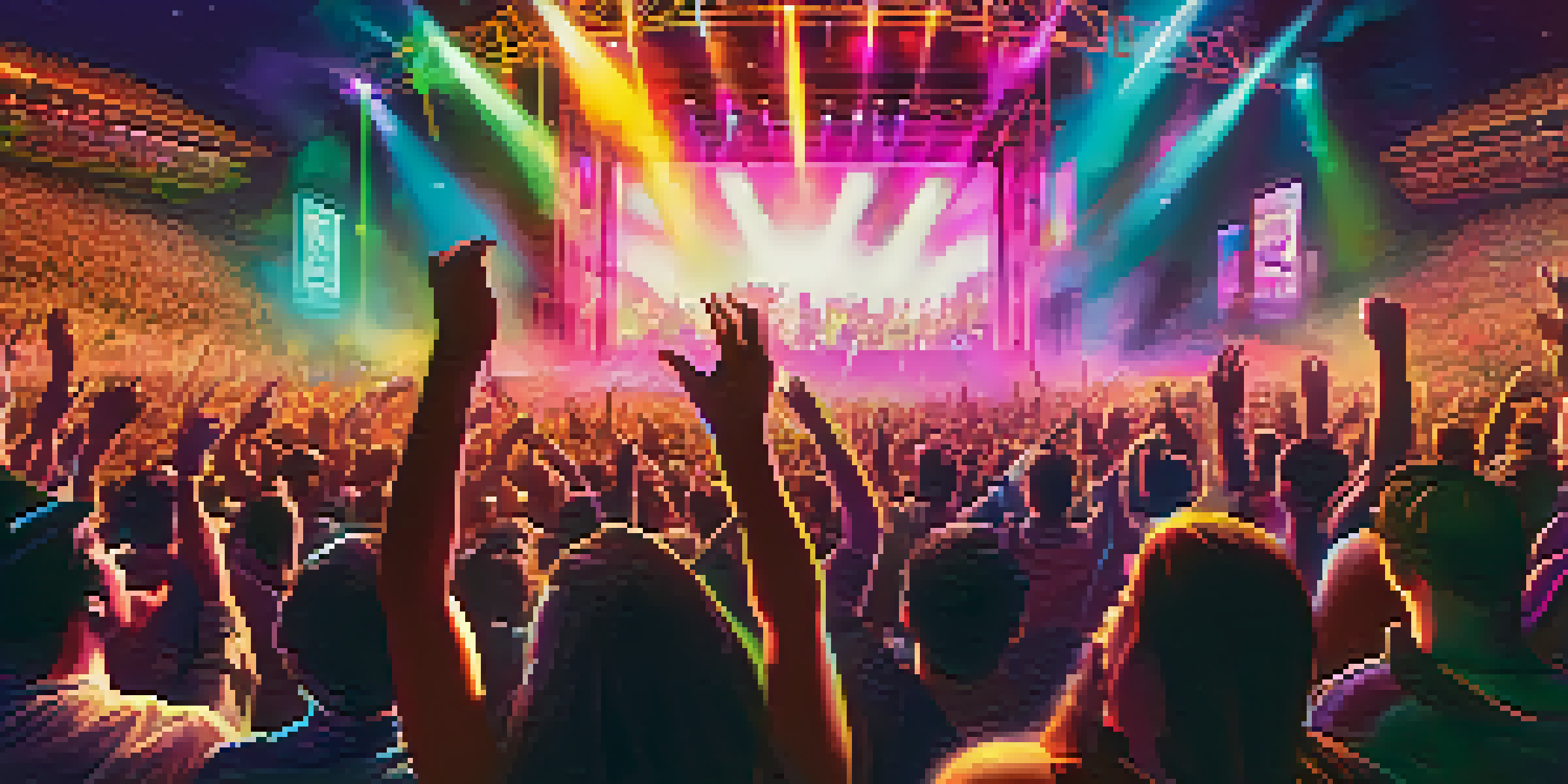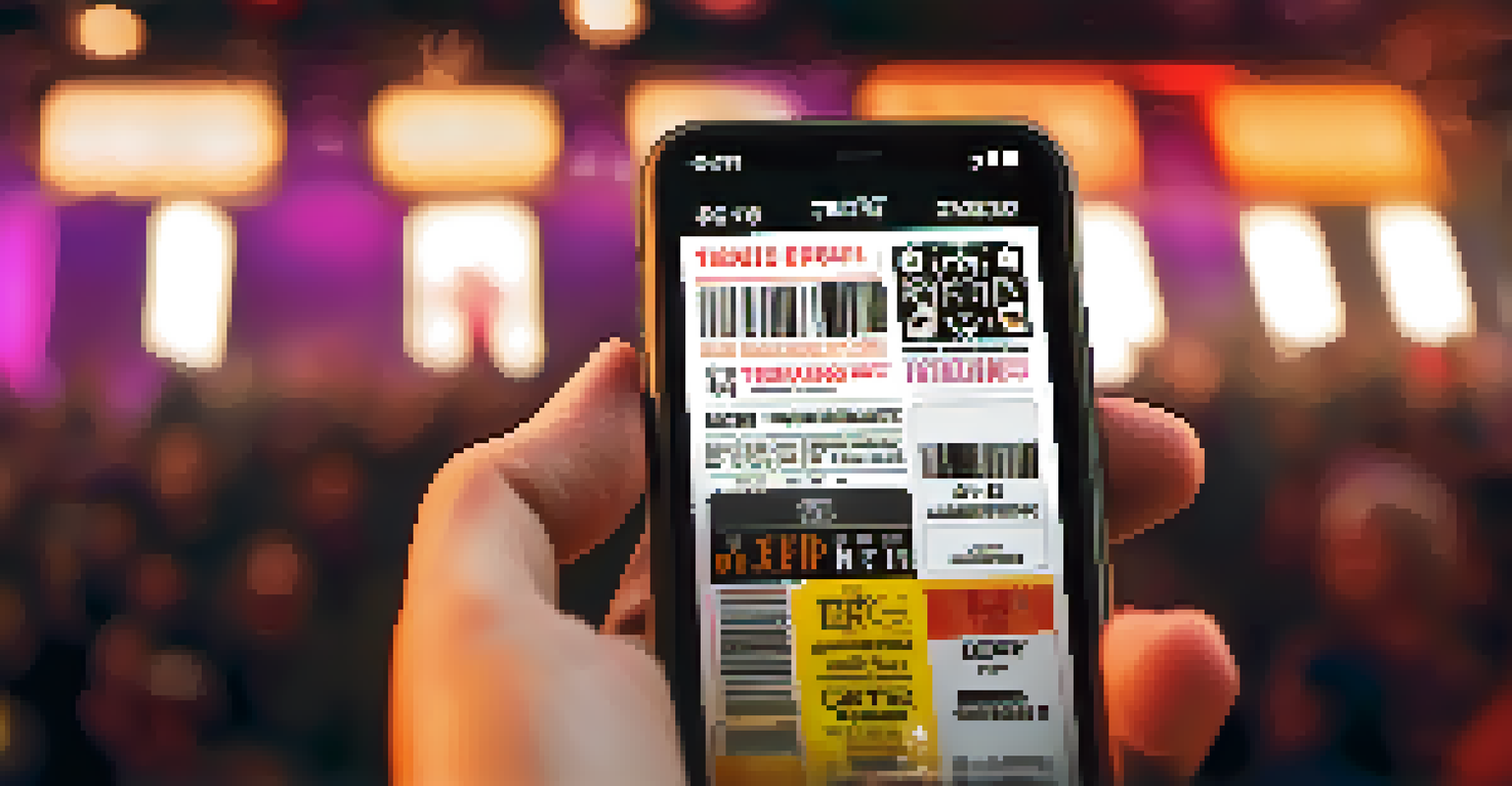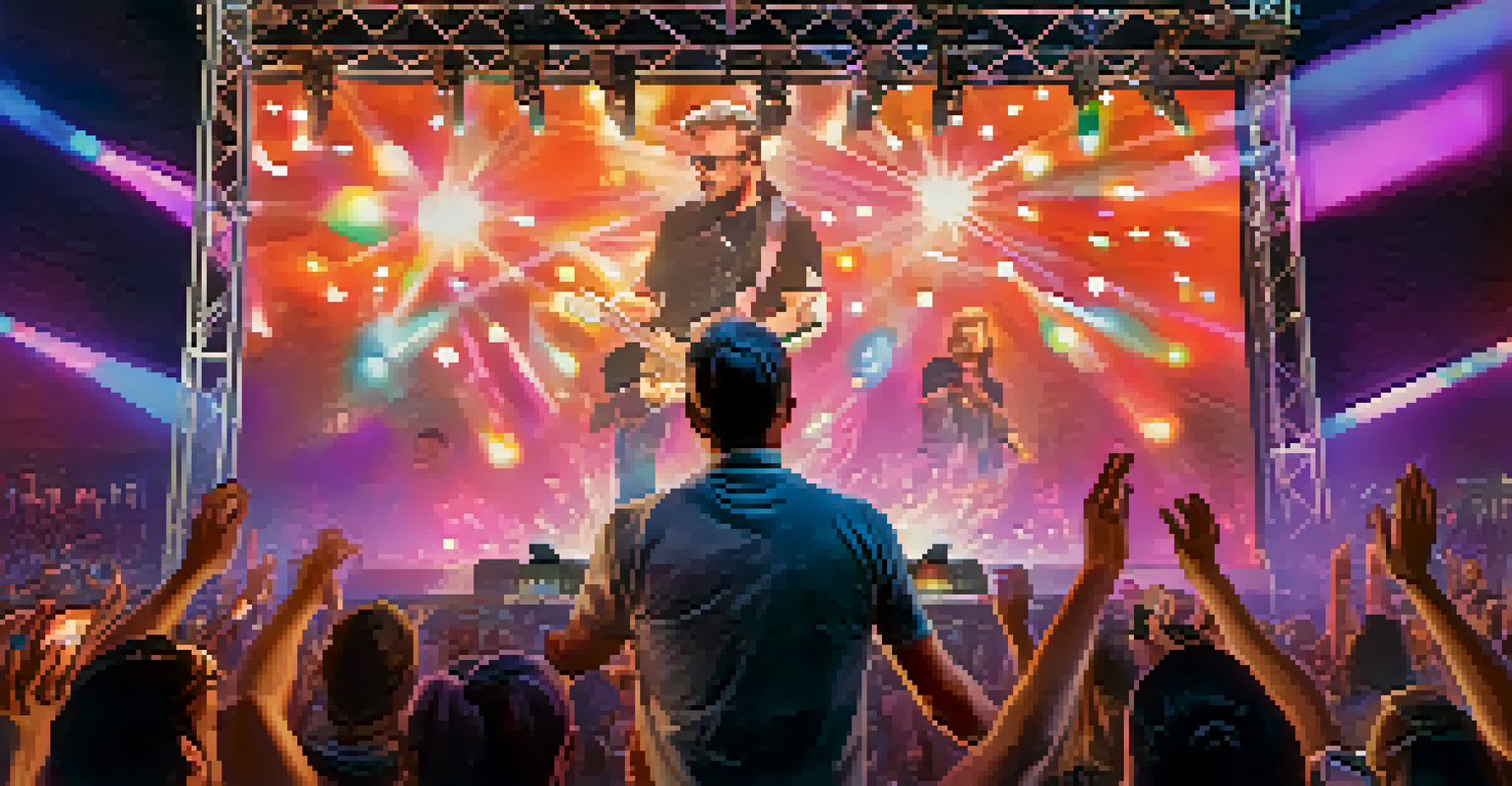NFTs and the Future of Concert Tickets and Experiences

Understanding NFTs: The Basics for Concert Lovers
NFTs, or non-fungible tokens, are unique digital assets that represent ownership of a specific item or piece of content, often stored on a blockchain. Unlike traditional tickets, which can be easily duplicated or forged, NFTs offer a verifiable proof of authenticity, making them particularly appealing for concert tickets. Think of an NFT as a digital collectible that not only grants entry to an event but also adds value through its uniqueness.
The future of live music is not just about the music; it's about creating unique experiences that fans will cherish forever.
This uniqueness opens up a world of possibilities for fans and artists alike. Imagine owning a ticket that not only gets you into a concert but also includes exclusive content, like a behind-the-scenes video or a personal message from the artist. This added layer of engagement creates a more meaningful connection between fans and their favorite performers.
As the live music industry continues to evolve, understanding NFTs becomes crucial for both artists and fans. By embracing this technology, we can look forward to a future where concert experiences are tailored and enriched, making every event feel like a once-in-a-lifetime occasion.
How NFTs Enhance Fan Experiences at Concerts
NFTs have the power to dramatically enhance the fan experience by offering exclusive perks that traditional tickets cannot. For instance, some artists might issue NFTs that grant holders VIP access, meet-and-greet opportunities, or even special merchandise. This creates a sense of exclusivity and makes fans feel valued, as they can enjoy benefits that are not available to the general ticket-buying public.

Moreover, the ability to resell NFTs on secondary markets opens up new revenue streams for both fans and artists. If a fan can no longer attend a concert, they can sell their NFT ticket to another eager attendee, often at a premium price. This not only gives fans more flexibility but also helps artists earn additional income from secondary sales.
NFTs Enhance Concert Experiences
NFTs provide unique digital tickets that offer exclusive perks, creating a deeper connection between fans and artists.
As these experiences become more prevalent, we can expect a shift in how fans interact with their favorite musicians. By incorporating NFTs into the concert experience, artists can deepen their engagement with fans, making every show feel unique and special.
The Role of Blockchain in Ticket Authenticity
One of the biggest challenges in the ticketing industry has been counterfeit tickets. This is where blockchain technology shines, providing a secure and transparent way to verify ticket authenticity. Each NFT ticket is recorded on the blockchain, making it nearly impossible to forge or duplicate, thus ensuring that fans are getting what they paid for.
In a digital world, the ownership of unique assets can transform how we connect with artists and their work.
This level of security not only protects fans but also benefits artists and event organizers. By reducing fraud, they can increase trust in their ticketing processes, which can lead to higher sales and more satisfied customers. Additionally, with real-time tracking, they can gather valuable data about their audience and tailor future events to better suit fan preferences.
In the long run, the integration of blockchain technology into ticketing systems could revolutionize the industry, creating a safer and more efficient environment for all parties involved. As more artists and venues adopt these practices, we can expect a significant reduction in ticket fraud.
NFTs and Their Impact on Artist Revenues
For many artists, live performances are a crucial source of income, especially in an era where streaming services dominate music consumption. NFTs offer a new way for artists to earn revenue directly from their fan base, bypassing traditional intermediaries. By selling NFT tickets, artists can retain a larger share of the profits, which can be reinvested into their music and performances.
Moreover, NFTs can be bundled with other offerings such as exclusive content, merchandise, or future concert tickets, enhancing their value. This strategy not only drives immediate revenue but also fosters long-term relationships between artists and fans. For instance, a band could release an NFT that includes access to future shows, creating a loyal fanbase that feels invested in their journey.
Blockchain Ensures Ticket Authenticity
By utilizing blockchain technology, NFTs eliminate counterfeit tickets, providing fans with verified access to events.
As more artists explore the potential of NFTs, we may see a shift in how music is monetized. This shift could empower musicians to take control of their careers, leading to a more sustainable and artist-friendly industry.
Navigating the Environmental Concerns of NFTs
While NFTs offer exciting opportunities, there are valid concerns regarding their environmental impact, particularly due to the energy-intensive processes associated with blockchain transactions. Critics argue that the carbon footprint of minting and trading NFTs can be substantial, which has led to a push for more sustainable practices within the industry.
Many artists and platforms are now seeking eco-friendly alternatives, such as using blockchains that employ proof-of-stake mechanisms, which consume significantly less energy than traditional proof-of-work systems. This shift not only addresses environmental concerns but also appeals to increasingly eco-conscious fans who want to support sustainable practices.
By prioritizing sustainability, the NFT space can continue to grow while aligning with the values of both artists and their audiences. As this movement gains momentum, we can expect a more responsible approach to the creation and sale of NFTs in the concert industry.
The Future of Ticketing: What Lies Ahead with NFTs
As we look to the future, it's clear that NFTs are poised to play a significant role in the evolution of ticketing. With their ability to provide unique experiences and enhance fan engagement, NFTs can redefine what it means to attend a concert. We may soon see a landscape where every ticket sold is not just a pass to an event but a collectible that holds lasting value.
In addition to concert tickets, NFTs could expand into various aspects of the live music experience, like virtual meet-and-greets, exclusive content releases, or even digital merchandise. This diversification could lead to more personalized and immersive experiences for fans, ultimately changing the way they interact with their favorite artists.
NFTs Boost Artist Revenues
Selling NFT tickets allows artists to retain more profits, fostering long-term relationships with their fanbase.
As technology continues to advance, the integration of NFTs into the concert experience will likely become more sophisticated. We can only imagine the innovative ways artists and fans will connect, creating a vibrant future for live music.
Conclusion: Embracing the NFT Revolution in Live Music
In conclusion, NFTs represent a groundbreaking shift in the way we think about concert tickets and fan experiences. By offering unique, verifiable assets, they not only enhance the authenticity of ticketing but also create exciting new revenue streams for artists. As we navigate this new landscape, it's essential for both fans and musicians to embrace the opportunities that NFTs present.
The potential for deeper engagement, enhanced experiences, and sustainable practices makes this a truly exciting time for the live music industry. With each concert, the possibilities are endless, and the connections between artists and fans will only strengthen. It's an evolution that we should all be eager to witness.

As we move forward, staying informed and adaptable will be key. By embracing the NFT revolution, we can help shape a future where concerts are not just events but memorable experiences that resonate long after the final note has faded.